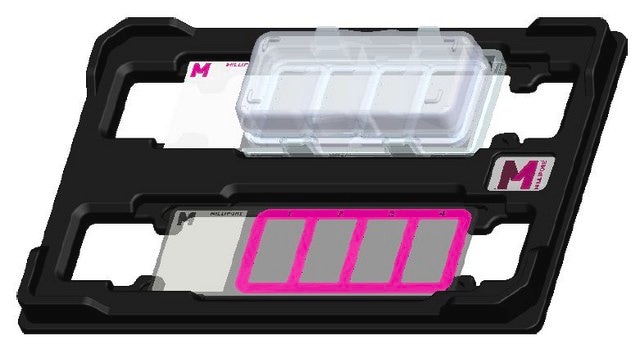PEZGS0416
Millicell® EZ Slide
4-well glass chamber slide, 1.7 cm2/well, 16/pk, sterile
Synonym(s):
4 well glass slide, Chamber slides
About This Item
Recommended Products
material
polypropylene wells
polystyrene lid
soda-lime glass slide
Quality Level
sterility
ethylene oxide treated
sterile
feature
Raised corner ridges on the lid facilitate stacking of multiple units
packaging
box of 16 (4 trays, 4 units/tray)
manufacturer/tradename
Millicell®
technique(s)
cell based assay: suitable
cell culture | mammalian: suitable
immunocytochemistry: suitable
L × W × H
75 mm × 25 mm × 1 mm, slide only
77.8 mm × 33.8 mm × 13.9, excluding lid
L × W
77.8 mm × 33.8 mm × 16.2 mm, including lid
size
4 wells
well surface area
1.7 cm2
well volume
500-1700 μL
shipped in
ambient
General description
Preparation Note
- Culture, fix, and stain the cells according to preferred protocol.
- To access the microscope slide, hold the Millicell® EZ SLIDE down on a flat surface and break the four tabs by pushing them down with the thumb. Remove the cover. Hold the slide down and lift the wells upward to remove. Remove slide from holder.
Legal Information
Certificates of Analysis (COA)
Search for Certificates of Analysis (COA) by entering the products Lot/Batch Number. Lot and Batch Numbers can be found on a product’s label following the words ‘Lot’ or ‘Batch’.
Already Own This Product?
Find documentation for the products that you have recently purchased in the Document Library.
Customers Also Viewed
Articles
High titer lentiviral particles for LC3 variants used for live cell analysis of cellular autophagy.
High titer lentiviral particles including beta-actin, alpha-tubulin and vimentin used for live cell analysis of cytoskeleton structure proteins.
High titer lentiviral particles including beta-actin, alpha-tubulin and vimentin used for live cell analysis of cytoskeleton structure proteins.
High titer lentiviral particles including beta-actin, alpha-tubulin and vimentin used for live cell analysis of cytoskeleton structure proteins.
Our team of scientists has experience in all areas of research including Life Science, Material Science, Chemical Synthesis, Chromatography, Analytical and many others.
Contact Technical Service








